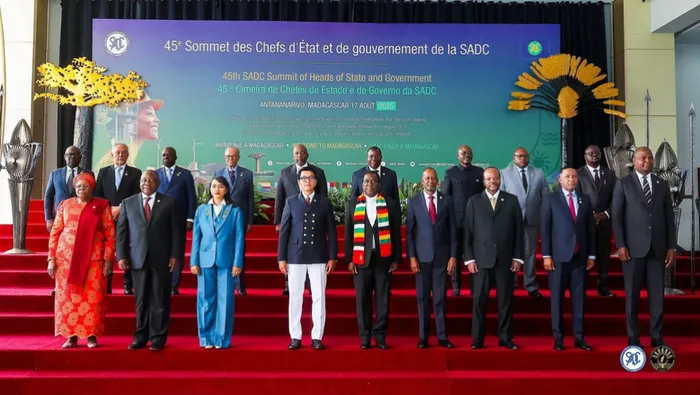SADC Leaders' Ambitious Pledges Demand Action, Accountability

SADC leaders' at the 45th Heads of State Summit held in Madagascar on August 17. Madagascar's President Andry Rajoelina (front, 4th left) was elected Chairperson of the regional body.
Image: SADC/X
Kim Heller
At last week's SADC Summit in Antananarivo, Madagascar, there were ambitious pledges to accelerate industrialisation, protect food security, promote energy transition, and end instability and conflict.
The Summit, with a sparkling new Chairperson and fresh input from the newly elected Presidents of Botswana and Namibia, was a key opportunity to advance SADC's Vision 2050 for peace and prosperity in Southern Africa.
The new SADC Chairperson, President Andry Rajoelina of Madagascar, emphasised the need for strong ideas and effective implementation. However, the impact of SADC has historically been diminished by its lack of practical action and accountability, with many promises failing to go beyond verbiage. The splendid appeal of regional integration and industrialisation has begun to wane.
It was encouraging to see leaders from member states reinvigorate the issue of industrialisation at this latest gathering. They vowed to enhance mineral beneficiation, agro-processing, and manufacturing, and reiterated the urgency of reducing dependency on foreign raw material imports. President Duma Boko of Botswana spoke clearly about halting the export of raw resources, which exacerbates the poverty of the people of Southern Africa.
By using Southern Africa's vast mineral resources for regional processing and beneficiation, the region can develop into a powerhouse, enhance its global competitiveness, and foster sustainable prosperity. However, the absence of a standard and collective policy framework and insufficient funding continue to pose significant implementation challenges. It is estimated that foreign partners, not member states, fund 9 in 10 regional projects.
Agriculture and food security were key topics at the Summit. Rajoelina pledged to mechanise farming systems. He said, "We will be able to triple our yields, from 2.5 to 9 tons per hectare in the coming years." SADC Executive Secretary Elias Magosi stressed the need to transform agriculture and spoke of how almost 60 million people experience food insecurity.
The launch of an updated SADC Climate Resilience Framework, which includes suggestions for the diversification of crops, smart climate agriculture, early warning systems, and a regional green energy fund, is a positive development. However, financial and budgetary shortfalls often leave such crucial projects severely under-resourced.
As expected, energy security was a top agenda item. While the rekindled commitment to renewable energy is promising, headway will continue to be significantly impeded by power shortages and deficient infrastructure, especially in rural areas.
Southern Africa depends on coal for over 60 per cent of its electricity needs, which means that achieving a just transition to cleaner energy will be no easy journey. The transition will necessitate significant investment in infrastructure, technology, and expertise, along with a revolutionary policy metamorphosis.
There was much discussion on enhancing regional trade and market integration. There were proposals on private sector partnerships, tariff-free trade, corridors, and common trade protocols and policies. Intra-SADC trade is currently around 20 per cent, well below the AfCFTA target of 40 per cent by 2030. Non-tariff barriers, inefficient border systems, restricted labour mobility, and poor infrastructure hinder progress.
Lessons can be learnt from the approach taken by the East African Community (EAC). The EAC has reduced border crossing times by 70 per cent, significantly decreased costs, and enhanced regional trade. Regional visas could help SADC member countries improve labour mobility, but security concerns may hinder this in the short term.
The Summit reaffirmed its support for SAMIM in Mozambique, a regional initiative focused on addressing the security risks in the country, and for SAMIDRC in the Democratic Republic of Congo. Despite the discussions, there seems to have been little focus on operational failures, key fault lines, and funding gaps in peacekeeping and conflict resolution.
The need for youth empowerment and digital innovation was noted. This focus is critical in a region where over 60 per cent of the population is under twenty-five years of age. There did not appear to be a clear plan or funding on this matter.
The 45th SADC Summit's focus on industrialisation, agricultural renewal, green energy, regional integration, and youth empowerment was on point in terms of the current crisis and opportunity landscape in Southern Africa. These pledges now need to be brought to life through strict deadlines, transparent financing, and visible accountability.
Promising ideas are royal, but implementation is always king. The reasons why SADC has failed to fulfil its commitments are multifaceted. External dependencies and funding continue to diminish the region's sovereignty, placing external interests above domestic benefit.
The perpetual challenge of country-specific wants and needs versus regional interests is a juggle and continues to hinder the collective power and influence of the region. Resolute and visionary leadership has been lacking, alongside effective implementation, responsible project management, and accountability.
As the intoxicating post-Summit optimism wears off, the challenges of implementation may dull and threaten purpose and promise. There has never been a time when tangible action is more urgent for Southern Africa.
The political will of SADC, its new leadership, and member states will determine the legacy of this regional bloc. Grand ideas without resilient and meaningful follow-through will have historical ramifications. The region will remain in junk status rather than being elevated if the pile of broken SADC promises grows.
South Africa’s President, Cyril Ramaphosa, delivered the vote of thanks at the Summit. He said that Rajoelina’s speech was inspiring and "underpinned by a bold vision and regional ambition". Ramaphosa stated that the SADC is in good hands. He said, “We are confident that under your stewardship, SADC will continue to advance regional integration, economic resilience, and sustainable development." The challenging work begins now. It is all hands on deck.
* Kim Heller is a political analyst and author of No White Lies: Black Politics and White Power in South Africa.
** The views expressed do not necessarily reflect the views of IOL, Independent Media or The African.